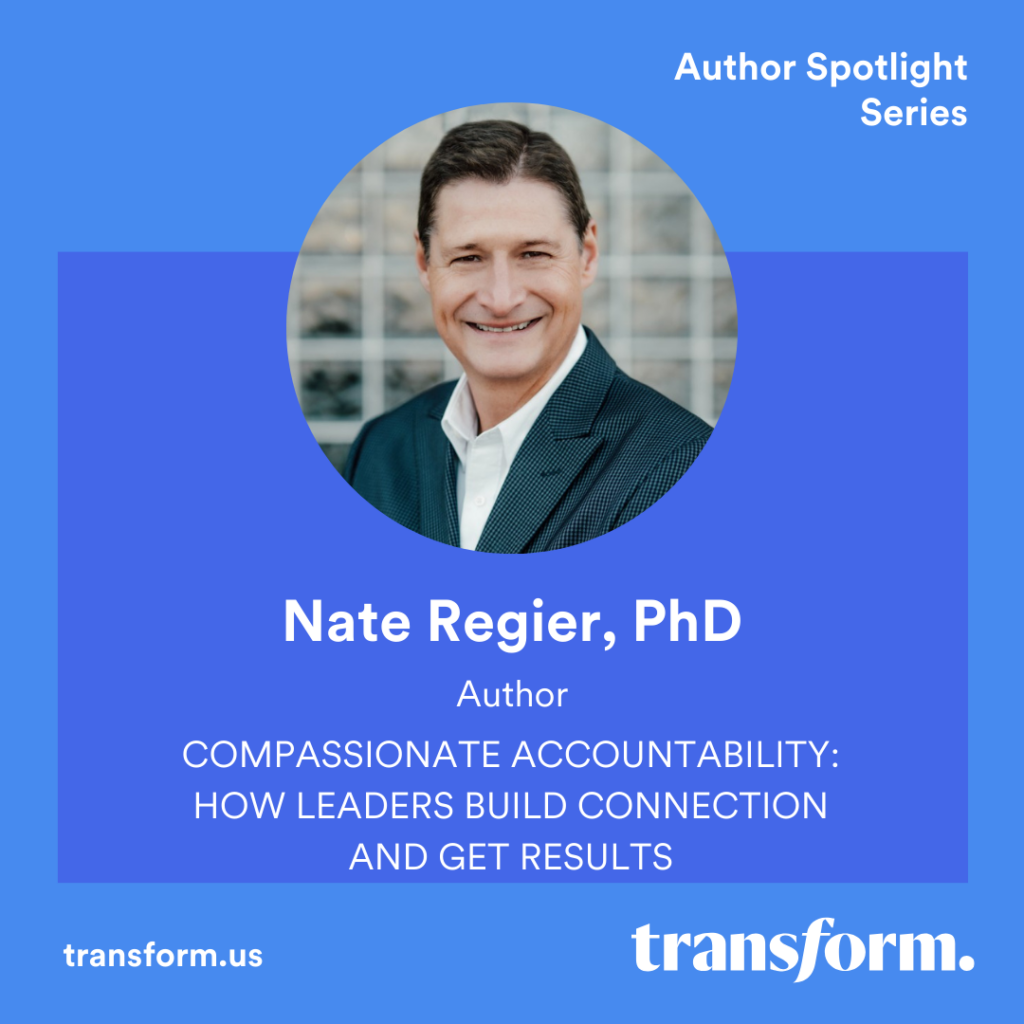
Welcome to Transform’s Q&A Author Spotlight Series, where we feature insightful authors who are redefining people and culture, work, leadership, and technology. Join us to gain fresh perspectives and practical knowledge from those at the forefront of today’s evolving professional landscape.
About The Author
Nate Regier, PhD, is the Founder and CEO of Next Element. As CEO his purpose is to guide Next Element’s vision to bring compassion to every workplace in the world. Their three strategic goals are: 1) Develop and disseminate cutting edge tools to bring more Compassionate Accountability® to the workplace, 2) Train, certify and support a global network of professionals who are using our tools, and 3) Partner with others to elevate the message of compassion at work. Business development, strategic partnerships, and thought leadership are my primary duties. He is also author of Compassionate Accountability: How Leaders Build Connection and Get Results.

About The Book and the Inspiration Behind It
Q: Share the story behind the moment(s) that inspired you to write your book, Compassionate Accountability: How Leaders Build Connection and Get Results
A: In 2019, I was approached by my publisher, Berrett-Koehler Publishers, about doing a second edition of my 2017 book, Conflict Without Casualties. I was in the middle of this process when the COVID-19 pandemic broke out. Watching what happened in our world, the divisiveness and confusion, led us to a conviction that never before in our world has the need for both Compassion and Accountability been greater. And leaders had no playbook for how to do this in a post-pandemic world. We had been developing and testing our Compassionate Accountability and Compassion Mindset frameworks between 2015 – 2019. We had just launched our Compassion Mindset enterprise system in late 2019, right before COVID shut everything down. But in 2021-2022, we realized we had to quickly bring this message to the world. So we switched gears and wrote Compassionate Accountability “CA” in record time – 4 months. The CA book is a compliment to our Compassion Mindset training.
Q: What is a brief overview of your book, Compassionate Accountability: How Leaders Build Connection and Get Results?
A: Never before in our history has the need for compassion AND accountability been greater. Everything from attracting and retaining top talent, to the success of your belonging initiatives, to your ability to innovate and adapt depends on it. This book will help you transform your culture in three steps: assess what matters most, develop daily leadership behaviors that make the biggest impact, and implement a framework to sustain positive momentum.
Compassionate Accountability demonstrates that people are valuable, capable, and responsible in every interaction. It is a breakthrough mindset recognizing compassion and accountability are not in tension. This is good news because when we choose compassion without accountability, we get avoidant cultures that can’t perform. But if we choose accountability without compassion, we get toxic cultures that can’t perform.
In the book, I lay out this big idea and present our discovery of The Compassion Mindset, consisting of three switches we must turn on internally to treat ourselves and others as valuable, capable, and responsible. I dedicate one chapter to each switch, showing the foundational belief behind it, why it’s critical for leadership, and how we can turn it on through our behaviors. A section on implementation is written for organizations that want to make compassionate accountability part of their DNA. The last section is about overcoming barriers to Compassion. Many people still think compassion is weak, that it’s just about empathy, or that it can’t be learned. I debunk five common myths and offer hopeful ways to build real compassion skills that make a difference at work. The book weaves in real-life experiences from over 50 leaders, authors, and visionaries featured on my podcast who have put these principles to work in their companies and lives.
One of my favorite book reviews was from Jeff Hayes, CEO of the Meyer’s Briggs Company. He said, Compassionate Accountability is not another theory but an actionable process for mindfulness, social and emotional intelligence, leadership agility, inclusion, presence, healthy conflict, and resiliency. I appreciate him saying this because we tried to make this book digestible, practical, applicable, and relevant.
Q: Could you share a memorable anecdote or story from your book, Compassionate Accountability: How Leaders Build Connection and Get Results?
A: The first time we used the Three Switches of the Compassion Mindset framework with a group was quite an experience. I was working with a dysfunctional family-owned business team led by a patriarch who didn’t want to let go and didn’t want to include his son in succession planning. We used the Three Switches, Value, Capability, and Responsibility, as our behavioral norms for the team-building process. This elicited a mindset shift in the group and with the patriarch, leading to a breakthrough between father and son. I tell the whole story in the book.
Q: What are the key points or thoughts you want to impact readers most?
A:
- Compassion and accountability are not opposites. They need each other.
- Compassionate accountability includes treating yourself and others as valuable, capable, and responsible in every interaction. This is the new core competency for leadership and thriving cultures.
- Leaders can no longer choose one over the other. The success of our most critical initiatives depends on both compassion and accountability; inclusion, innovation, engagement, attracting and retaining top talent.
- Compassion is so much more than empathy in action.
- Compassion can be learned.
- Compassion is good for business.
Q: As an author, what was the most rewarding part of researching and writing Compassionate Accountability: How Leaders Build Connection and Get Results?
A: Interviewing people for my podcast, reading their books, and learning from them about what compassion and accountability look like together. Over 50 of my guests are featured in the book. Also, the writing came naturally to me this time. We’ve been writing about this topic and teaching it to others for a while, so much of the book had already been articulated somehow. When my colleague, Rob Wert, read the manuscript, he told me, “Nate, you have finally found your voice. This book really sounds like you.” That meant a lot, and I think it represents my passion and genuine belief in the content.
Q: Describe the target audience for your book, Compassionate Accountability: How Leaders Build Connection and Get Results.
A: Three key audiences:
- Emerging leaders who need basic interpersonal communication skills to build strong, trusting relationships.
- Mid-level leaders who must create and coach a team culture that builds relationships and gets results.
- Executive-level leaders who envision the systems, processes, and frameworks that support thriving cultures.
Q: Who would get the most value from reading your book, Compassionate Accountability: How Leaders Build Connection and Get Results?
A: You will get value if you or your organization struggles with the tension between relationships and results. You will get value if you are jaded by pop psychology around culture and compassion. If you are looking for a unifying and powerful framework to approach the messiness of life, you will get value.
Q: Are there any misconceptions or common myths about HR and the Future of Work that you aim to dispel in your book?
A: Compassion is the great differentiator, but not the kind of compassion we are used to. It’s time to overcome the belief that compassion is just about kindness, empathy, and eliminating suffering. Compassion is about struggling with others through the tough stuff in a way that uplifts our value, capability, and responsibility.
The future of work, especially for leaders, will be energy management. Managing energy flow, especially with people, will be the key to success. Compassionate Accountability is a powerful framework for understanding how energy flows between people and in systems.
Conflict is the bridge between compassion and accountability.
Conflict is not the enemy. It is a source of energy caused by diversity. It can be misused in drama or a catalyst for breakthroughs.
Q: Are there any particular authors, thought leaders, or books that have greatly influenced your perspective on HR and Culture?
A: Leadership and Self-Deception – a classic by Arbinger Institute
Lencioni’s Five Dysfunctions of a Team
Karpman’s Drama Triangle
Blanchard’s Servant Leadership Work
Dan Pink – all his books are amazing
Q: What unique experience do you, as the author, bring to Compassionate Accountability: How Leaders Build Connection and Get Results and its subject matter?
A: I’ve been exploring, studying, and teaching compassion my whole life. The first chapter outlines my journey. I grew up as a Mennonite missionary kid in Africa, where I experienced everything from malnutrition and poverty in Zaire to apartheid and racial violence in South Africa. I got a PhD in clinical psychology and practiced for 11 years before becoming a business owner and developer of leaders. I’ve studied mind-body-spirit health, compassion practices, leadership, culture, social-emotional intelligence, conflict, and interpersonal communication. I’ve written four books around the themes of compassion, culture, and leadership. I write a blog and host a podcast as a way to keep learning and honing my craft of communicating concepts in ways that people can apply to their own lives.
Q: Are there any new projects or upcoming books you’re working on that you’d like to share a sneak peek of with our readers?
A: We are developing an e-learning course that teaches the 3-Switches of The Compassion Mindset. We intend for this course to provide ground-level orientation to the principles of compassionate accountability for all employees in an organization. We’ve also seen how this framework can greatly enhance a person’s receptivity to new learning, so we hope it will serve as a precusor and catalyst for educational programs, training and coaching worldwide.
We are exploring how AI can help us reach more people with these tools.
We are partnering with Stanford University to conduct research on the impact of our Compassionate Accountability and conflict communication templates.
I have two book ideas I’m percolating on. I am not sure which comes next 🙂
About the Reader
Q: Describe what a leader/organization looks like one year after reading your book, Compassionate Accountability: How Leaders Build Connection and Get Results, and committing to its teachings.
A:
- More confidence to navigate messy, complicated, and challenging situations
- A sense of stability, presence, and centeredness during uncertainty
- Clarity around the attitudes and behaviors that matter most
- Inner peace and sense of purpose
- Greater satisfaction as a leader
- Improved engagement from your employees
- More cohesive, trusting, and higher-functioning teams
- Unifying principles, processes, and behaviors for a thriving organization
- Hope that you can make a positive difference, especially in complex and difficult situations
Q: Considering a reader who just finished your book Compassionate Accountability: How Leaders Build Connection and Get Results and is processing all the great insights, what is the first step they should take to operationalize their learning?
A: Do the exercises in the book. There are quizzes and plenty of questions for reflection and discussion.
Take the Compassionate Accounatability Assessment in the Appendix to see where you, your team, and your organization score.
Check out the CA Resources Link for articles, tips, case studies, and more.
Subscribe to my blog, where I share weekly tips, tools, and resources for implementing CA.
Want more? Here’s a list of publications, articles, podcasts, and media appearances
Q: Share three takeaways from Compassionate Accountability: How Leaders Build Connection and Get Results that the reader should walk away with.
A: Compassion and Accountability can only work best together.
The Compassion Mindset sees people as valuable, capable, and responsible
The next generation of thriving workplace cultures will be defined by Compassionate Accountability.
Join us in engaging conversations and community as we transform the now and next of work together at Transform 2025.
